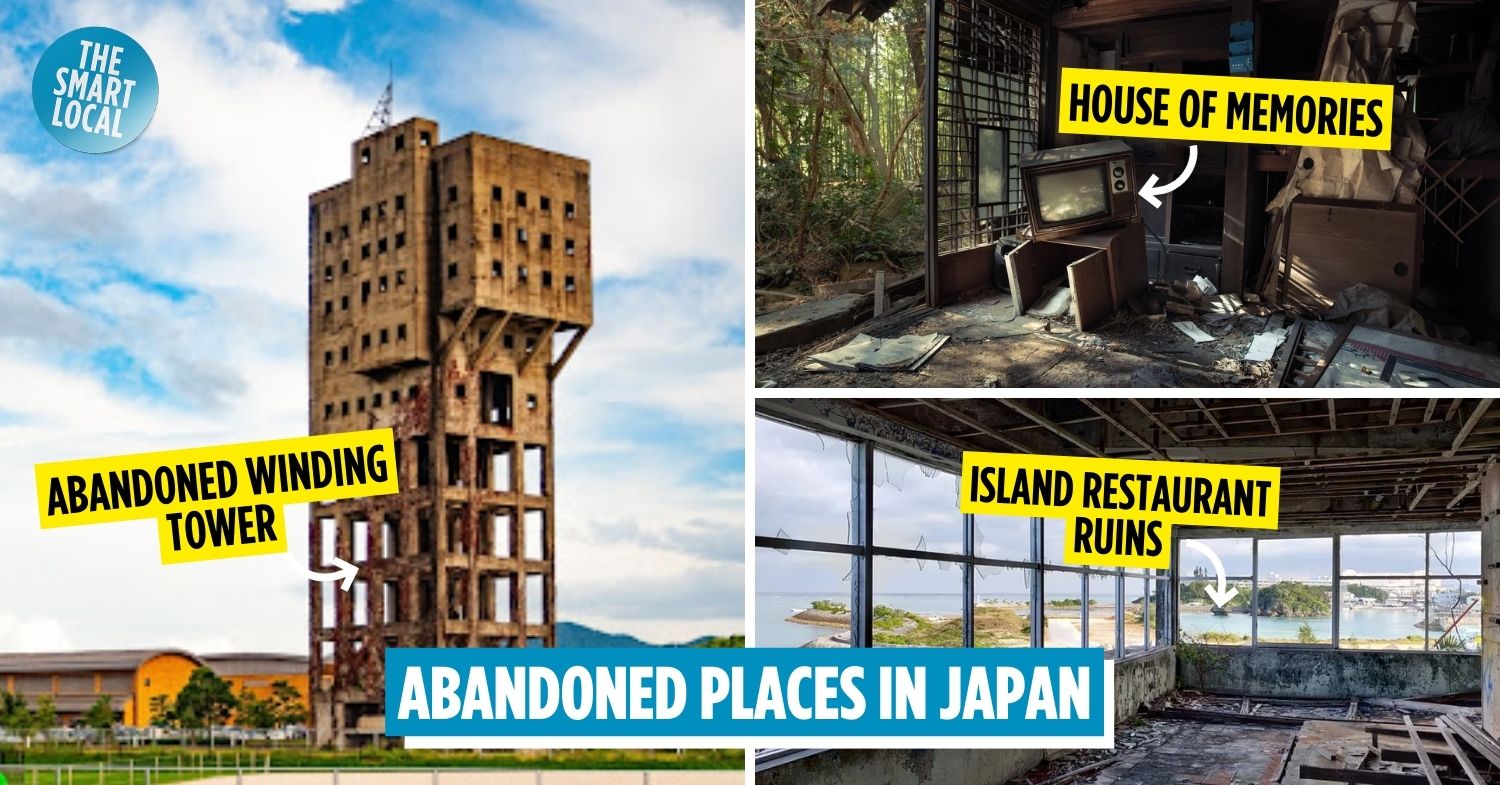Abandoned places in Japan
Abandoned places are the true museums, free from prior curation and showing everything in its raw state. Lovers of exploring such history-rich treasures in Japan have termed both the places and activity itself “haikyo” (廃墟), which means “ruins”.
While haikyo enthusiasts share a communal understanding that exact locations are not to be openly shared, some places have grown too famous to remain hidden. That said, it’s important to observe some unspoken rules: park your car a distance away from the haikyo you’re visiting to avoid damaging the premises, and only take pictures.
Put on that Indiana Jones hat as we weave through 9 abandoned places in Japan. While some of the locations don’t have an address, and others merely have their approximate locations hinted at, we’ve provided a Google Maps pin where possible.
Table of Contents
1. Green Hills Hotel
Closed in 1992, the 9-storey Green Hills Hotel remains standing in Miyazaki Prefecture. While the hotel has long since been covered in moss, becoming unfit for accommodation, it still gets considerable footfall from those out on a haikyo adventure or looking to do a test of courage, also known as kimodameshi (肝試し).
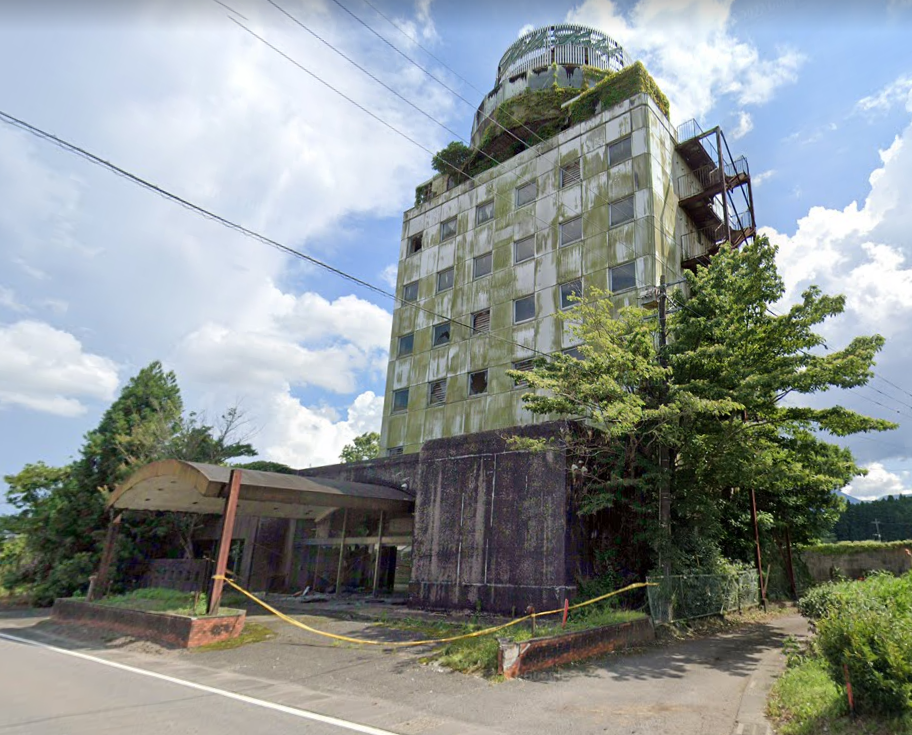
Image adapted from: Google Street View
The hotel interior itself screams scary, with walls that appear to have been mercilessly hacked.
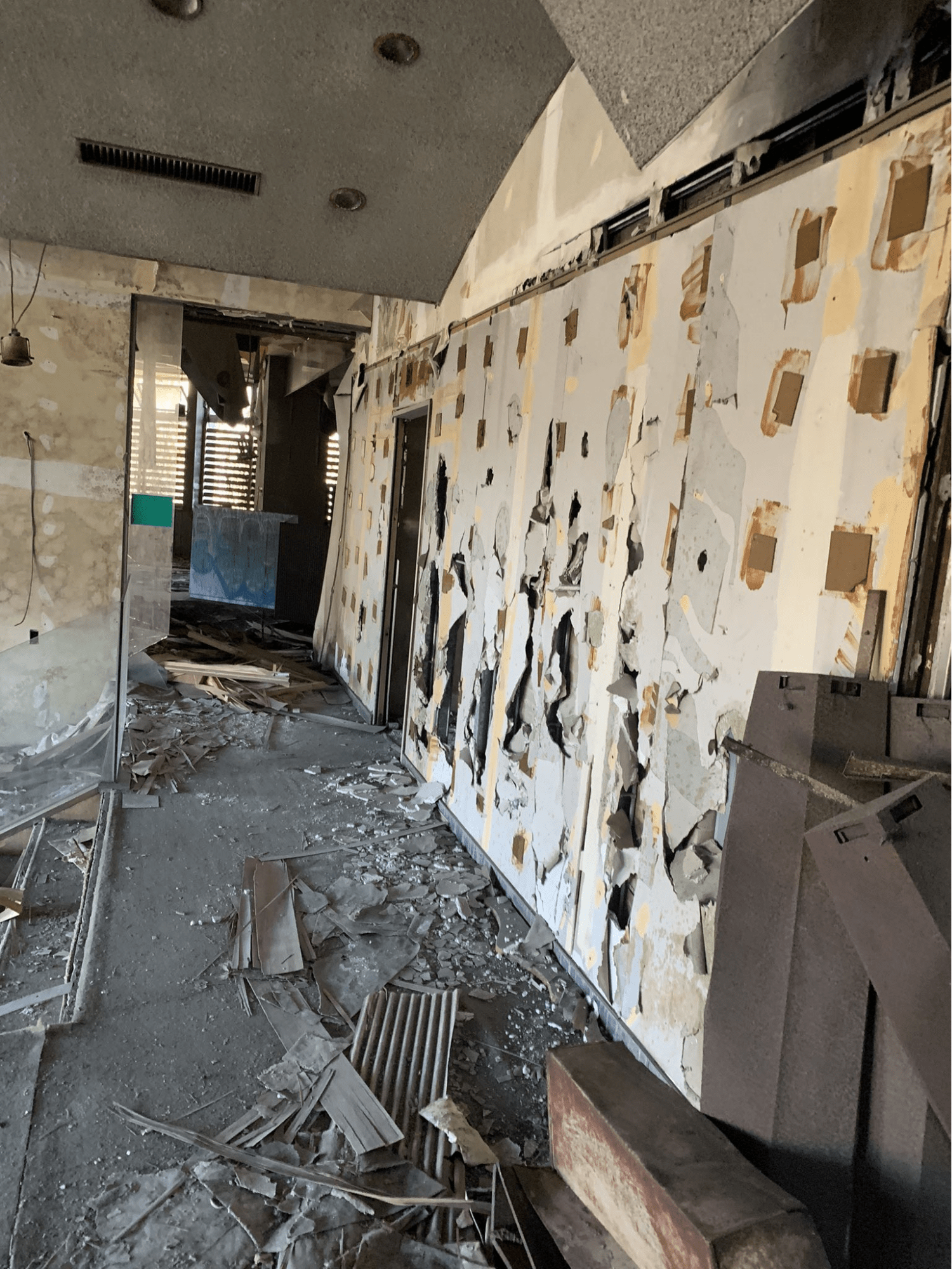
Image credit: @Apex_IQ3Prayer
As if that isn’t enough, the walls are also chillingly spray–painted with words, such as “kinshi” (禁死), in red. “Kinshi” (禁死) is a wordplay on “kinshi” (禁止) and “shi” (死), which mean “prohibited” and “death” respectively. Obviously, the messages serve as a stern reminder that entering Green Hills Hotel only beckons danger.
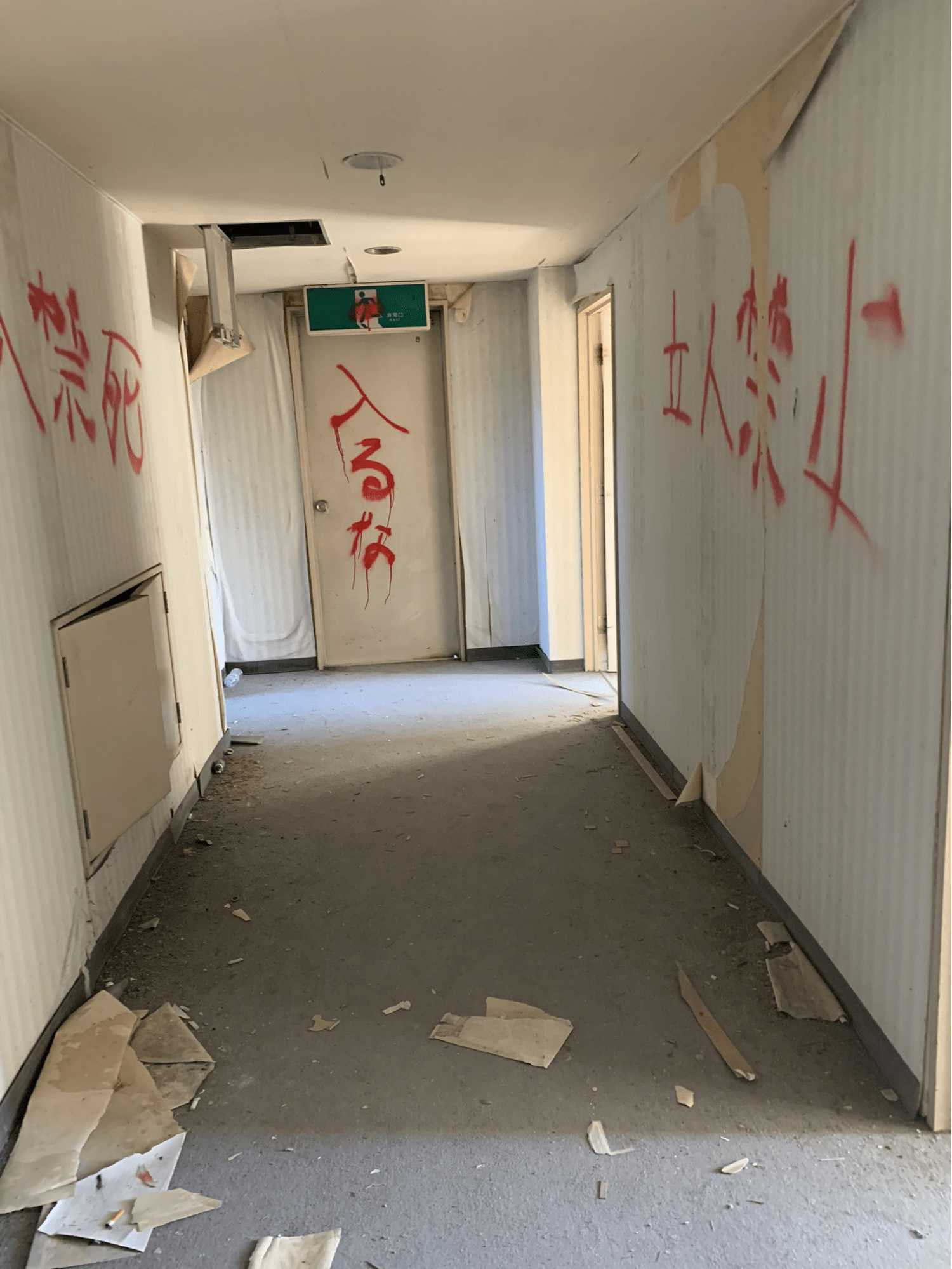
Threatening messages spray painted onto the walls.
Image credit: @Apex_IQ3Prayer
However, on the fateful day of 15th April 2020, the Miyazaki Prefectural Police were forced to defy the nasty messages and venture into Green Hills Hotel – they had received a call in the wee hours reporting the discovery of a corpse in Room 607.
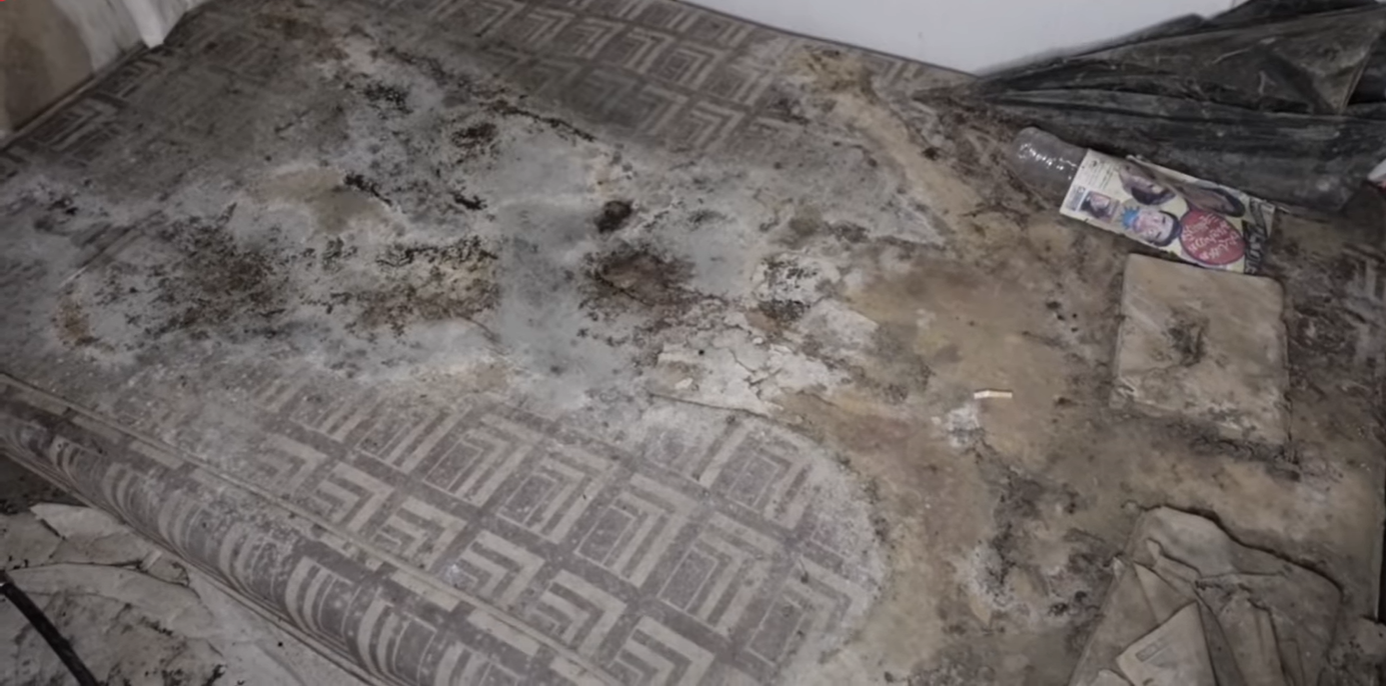
Where the corpse used to lie.
Image adapted from: 貧乏中年TV
2 men in their 20s were on a yolo adventure when they came across the corpse, which was decomposed beyond recognition. It measured 1.7 to 1.8m long and was of unidentifiable sex. Truly a kimodameshi gone wrong, the discovery left a huge impact on the 2 men, who expressed deep regret in having made the trip.
That’s not the end of the horrors Green Hills Hotel has to offer.
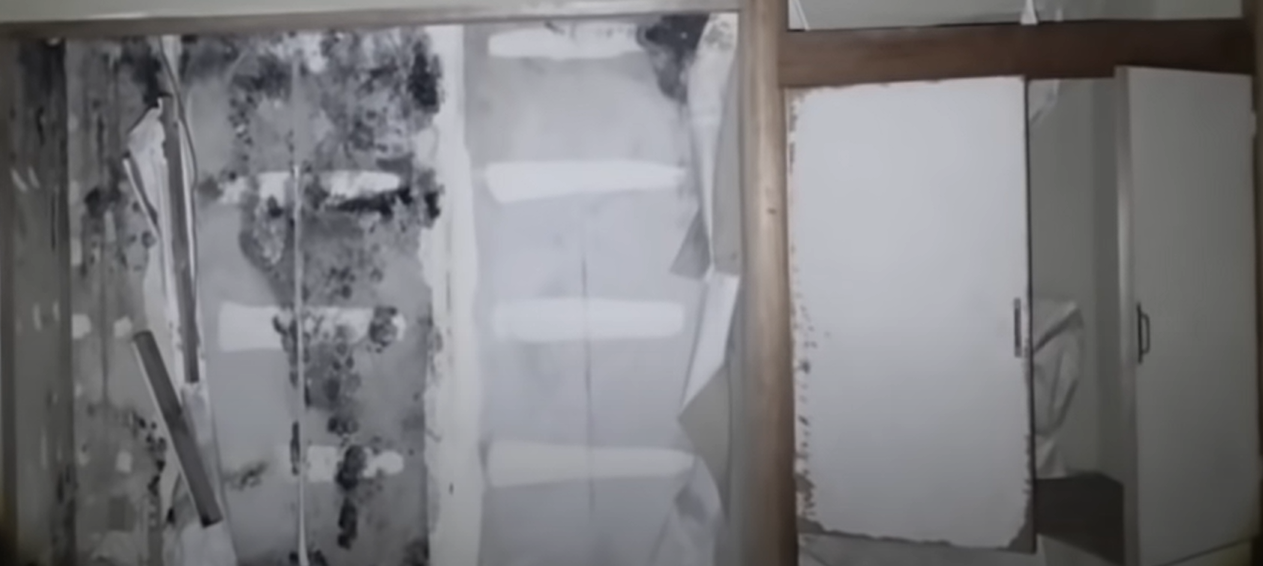
Image adapted from: 貧乏中年TV
Youtuber 貧乏中年TV made a trip down to the hotel one night. He was asked by a female stranger if he had heard a wind chime on the 2rd floor, to which he answered no. However, he had spoken too soon.
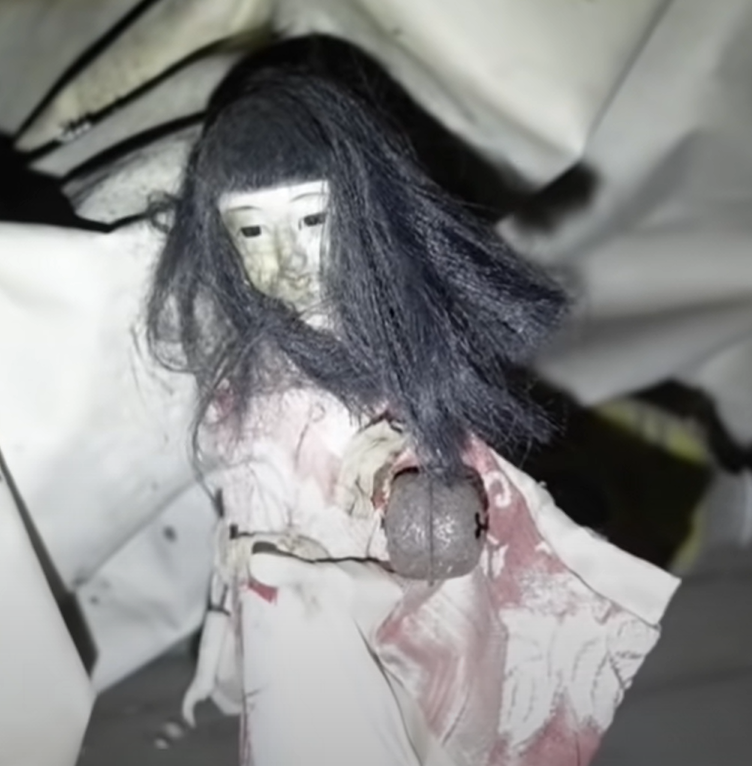
Image adapted from: 貧乏中年TV
When he later dropped by Room 202, he found a mysterious closet. Inside lay a Japanese doll with a bell attached to its waist, which was possibly the source of the sound.
Address: 4654-24 Okobira, Ebino, 889-4314 Miyazaki
Google Maps pin
2. Nichitsu Clinic
Nichitsu Clinic is located in the ghost town of Nichitsu, which previously housed miners working for the Nichitsu Corporation, as well as the miners’ families, from 1937 onwards. However, resources are bound to run out, and the same went for the mining area.
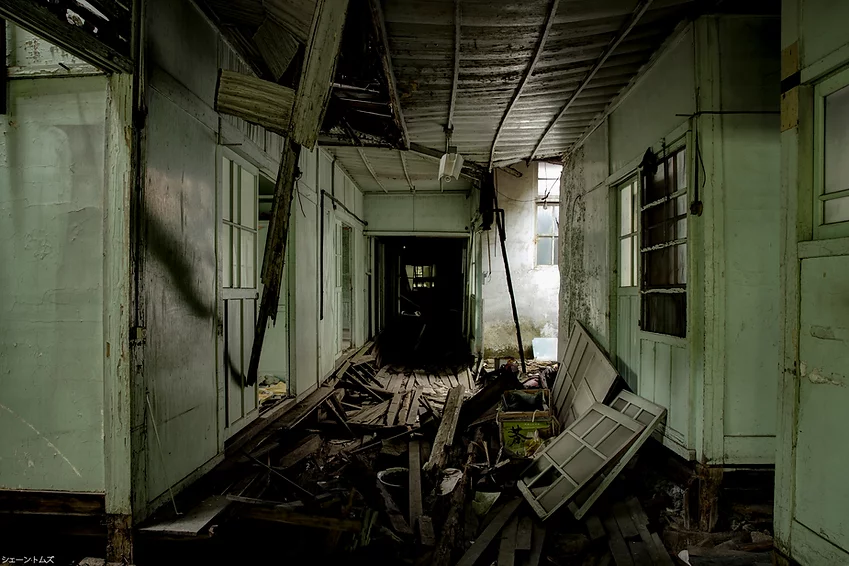
Image credit: Shanethoms
By 1978, Nichitsu’s exclusive residents began moving out one by one. Nichitsu Clinic, which used to serve the residents, turned into a place straight out of a horror game. In one of the rooms, a tilted wheelchair can be seen atop a pile of materials, as if symbolising the fall of the once–prosperous clinic.
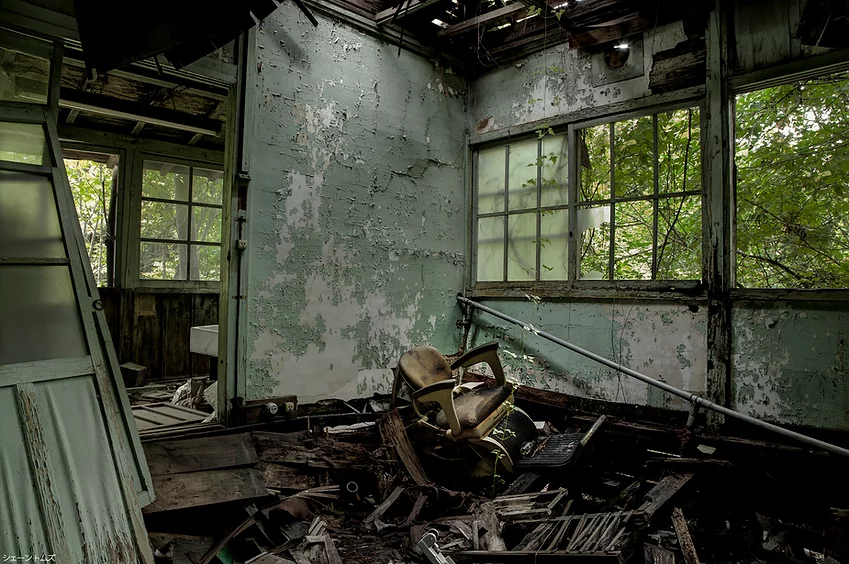
Image credit: Shanethoms
An operating table has also been left behind, though it presently looks more like a mad scientist’s workbench.
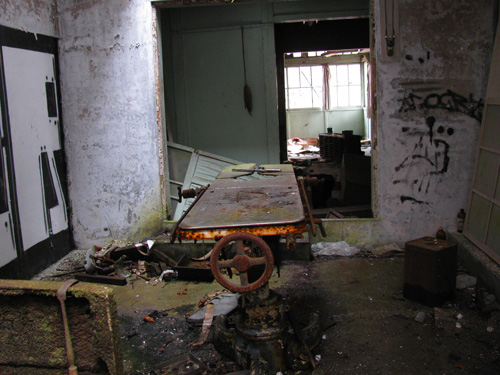
Image credit: Mike’s Blender
Aside from the wheelchair and operating table, several jars with organs or body parts has also been abandoned in the disused clinic. One such example is a brain preserved in what we presume to be formaldehyde.
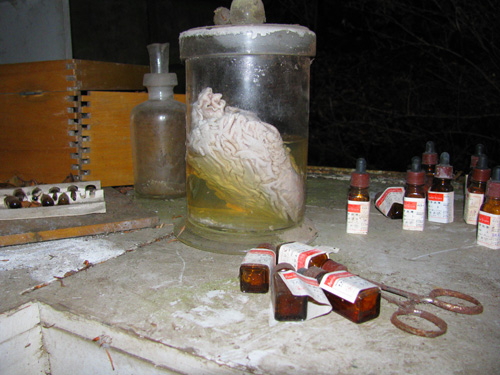
Preserved brain in a jar containing formaldehyde.
Image credit: Mike’s Blender
According to recent visitors, the brain has been whisked into the night by an explorer who paid no heed to the unspoken rules of haikyo. However, it could also very well be the brain’s owner reclaiming what’s theirs.
Address: Near Mitsumine, Chichibu, 369-1902 Saitama
Google Maps pin
3. Enakyo Wonderland Ropeway
Enakyō Wonderland Ropeway, also known as Shiruba Ichigo (シルバー号), was used to transport passengers from the now-abandoned Enakyōguchi Station to the Enakyō Land amusement park and vice versa. But when Enakyō Land closed in 2000, the ropeway service was discontinued.
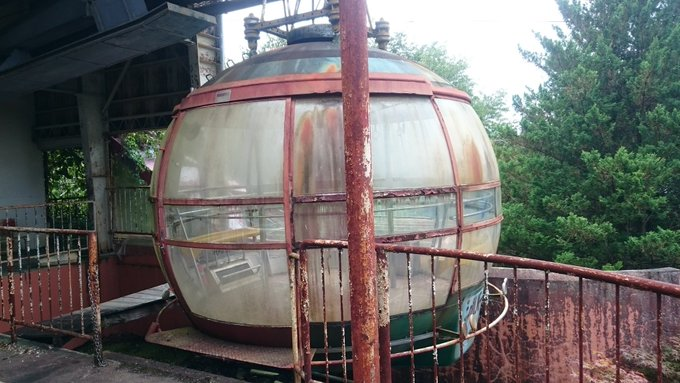
Image credit: @gdhtp921
After Enakyō Land reopened in 2002 and was rebranded as Enakyō Wonderland, the company decided to abandon a few of its old facilities, including the ropeway. The disused Enakyō Wonderland Ropeway, with its unique spherical shape that resembles that of an eyeball, appears to stare down at Enakyō Wonderland and its visitors 24/7.
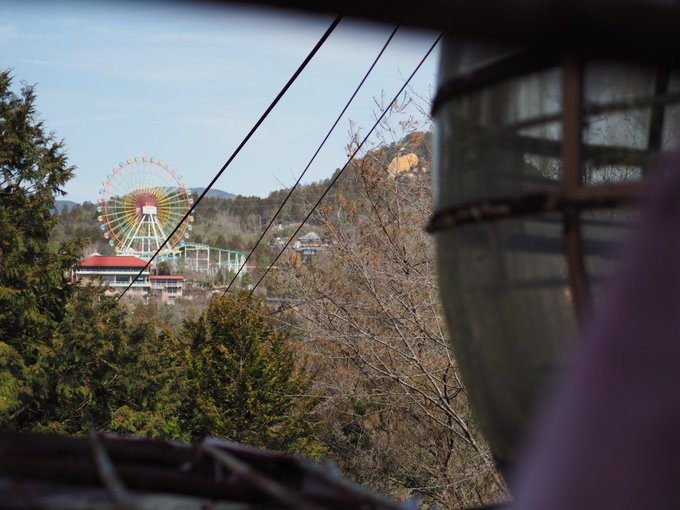
Image credit: @8Rinn
While supernatural activities haven’t been reported in the area, it’d be best not to let your guard down around the abandoned ropeway.
Address: Near Oicho, Ena, 509-7201 Gifu
Google Maps pin
4. Taisho Photographer’s House
A 2-storey standalone building, the Taishō Photographer’s house lies amid a bamboo grove in northern Japan.
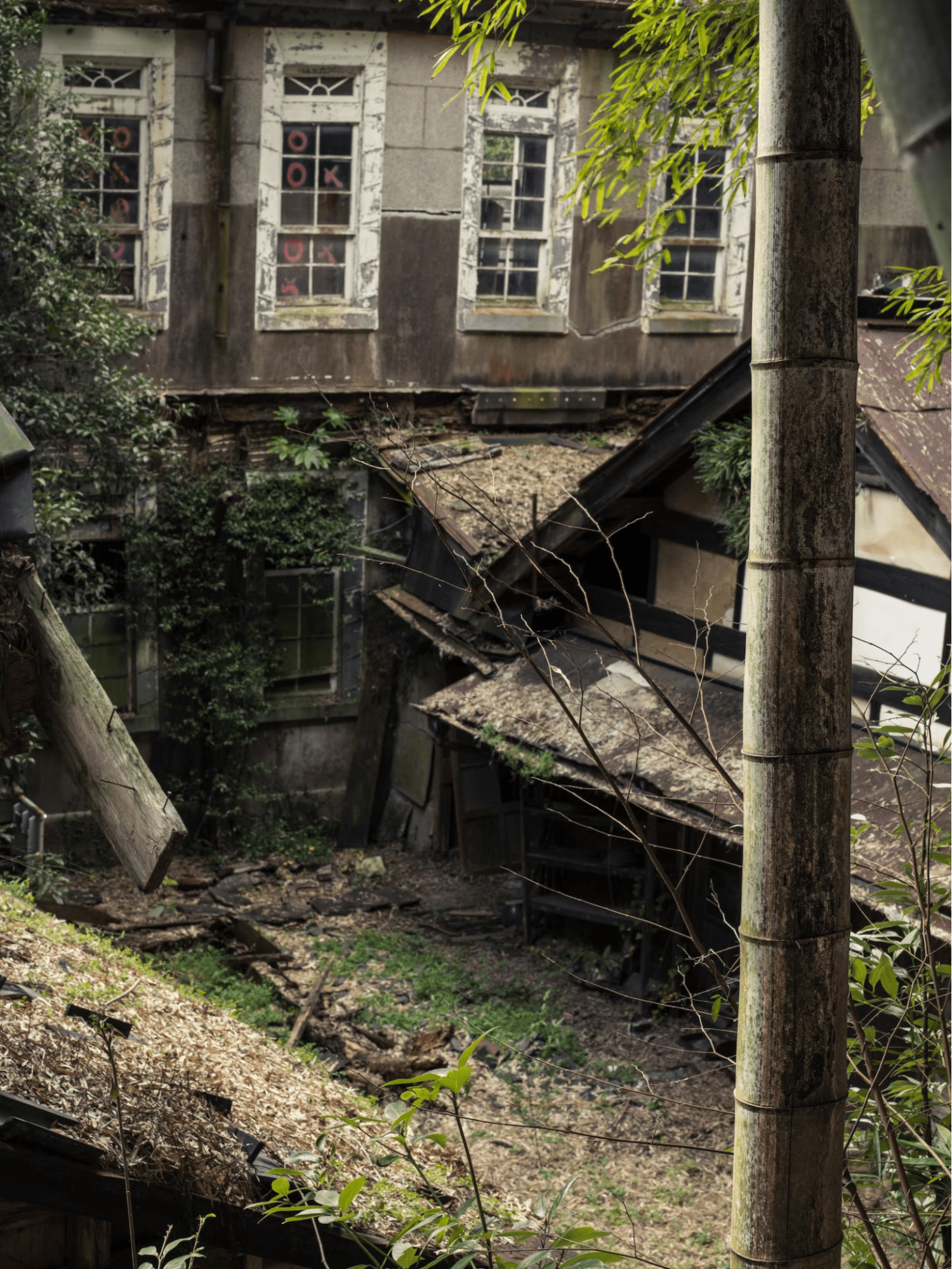
Image credit: Hamish Campbell
While the abandoned house’s exterior looks relatively decent, its interior reveals its age. Besides a collapsed roof, broken traditional Japanese windows made of wood and washi paper can also be seen.
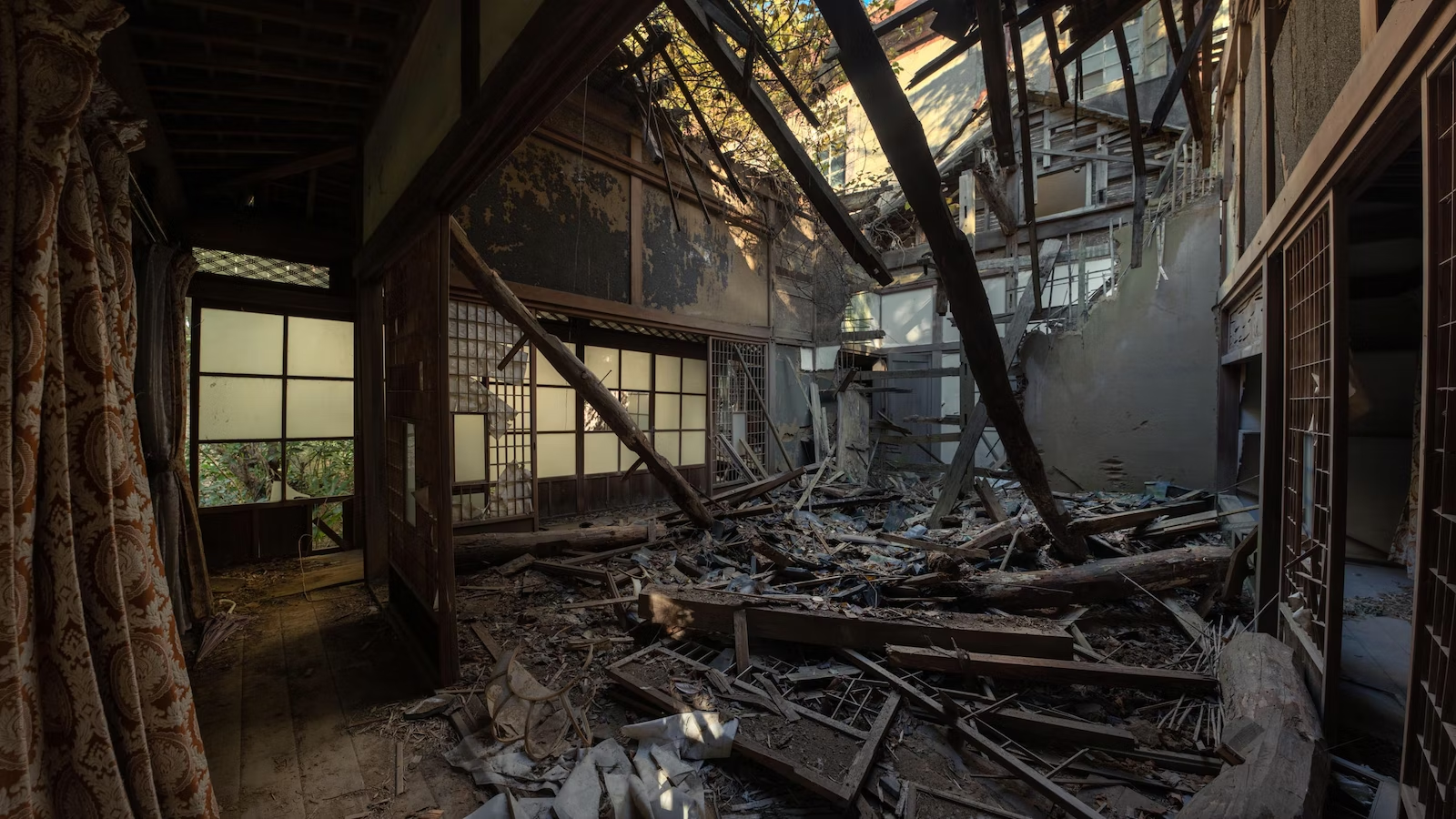
Image credit: Hamish Campbell
Old furniture, including an analog TV, also remain in the house. While these are all visible at a glance, modern photographer Hamish Campbell made a surprising discovery in 2016. He had found over 200 glass plate negatives of a photographer and his family on the 2nd floor.
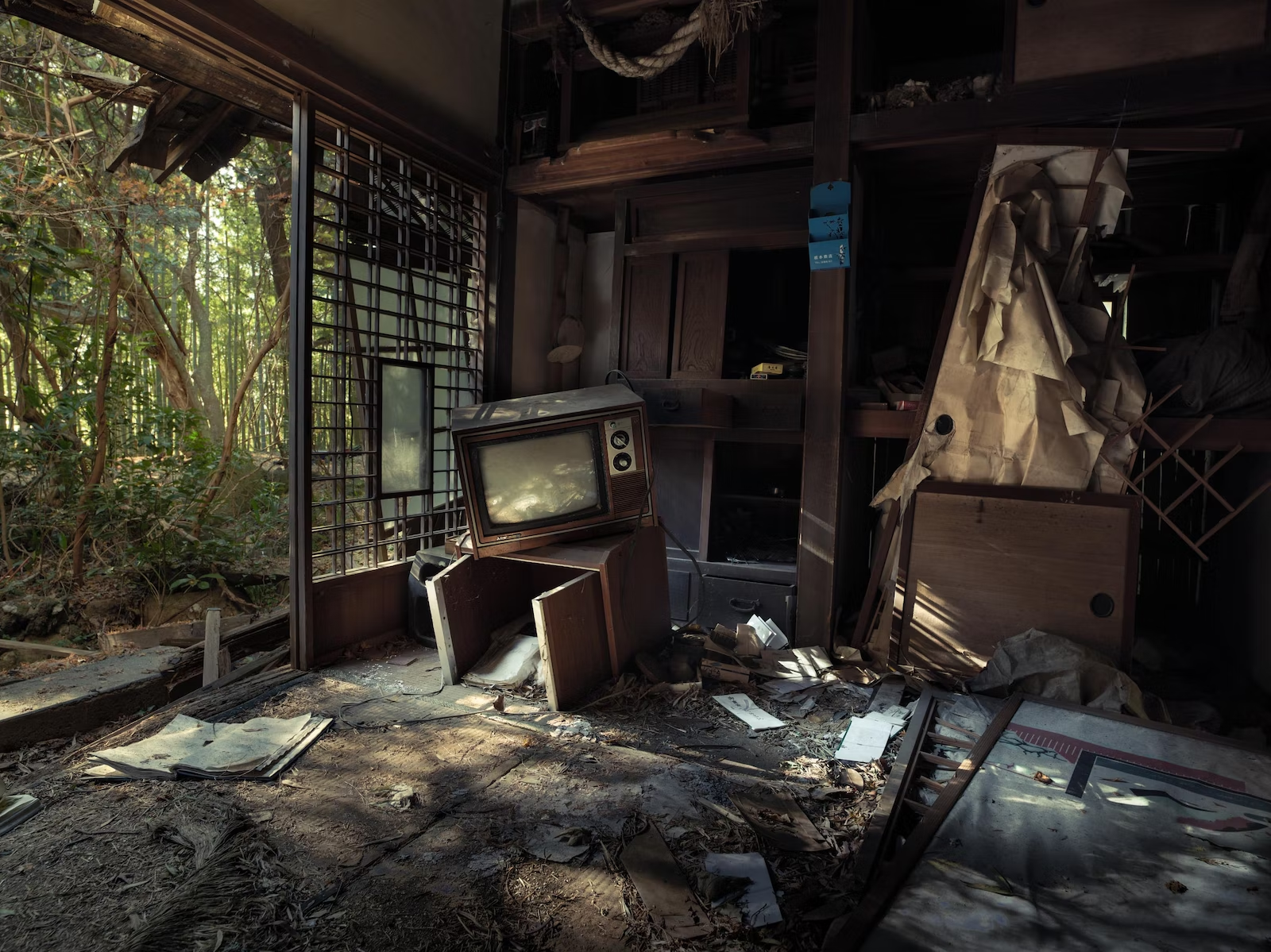
Image credit: Hamish Campbell
The glass plate negatives were discovered in what initially seemed to be a closet, but later turned out to be dark room. One of the more eye-catching negatives include a loving selfie of the photographer and his wife, which has been circulated on Twitter. Thanks to this discovery, he was dubbed the “Taishō Photographer”.
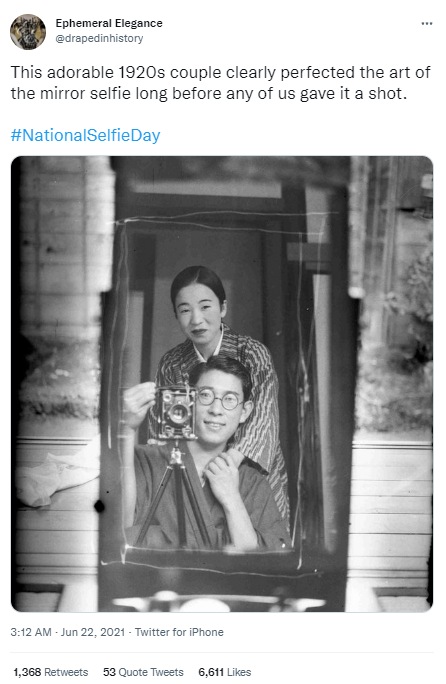
Image adapted from: @drapedinhistory
Other glass plate negatives include depictions of the Taishō Photographer’s everyday life and possibly his daughter.
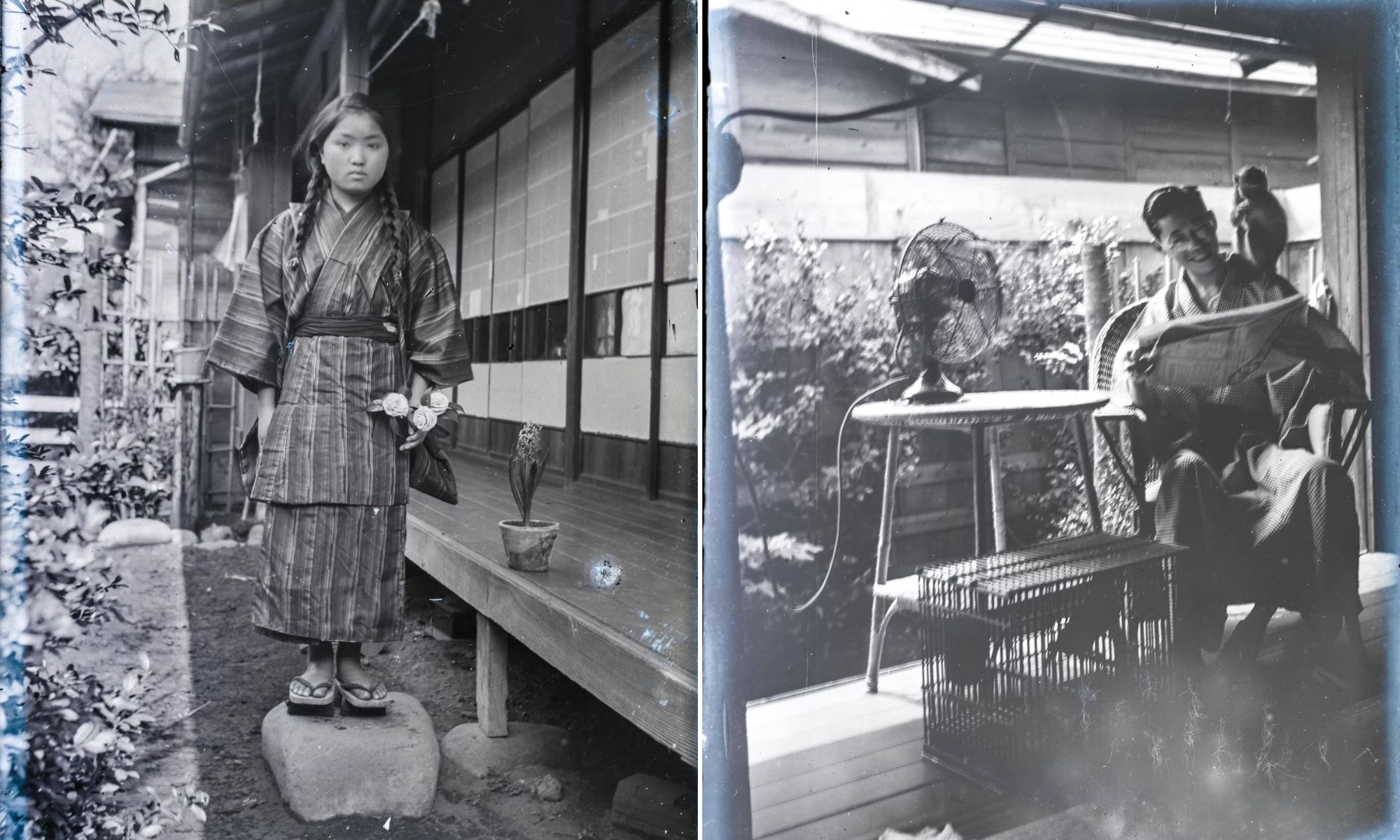
Image adapted from: Hamish Campbell
Check out Hamish Campbell’s full exploration video:
Video credit: Hamish Campbell
Address: On a hill in a bamboo grove in northern Japan
5. Western Village
Operating from the 1970s to 2007, Western Village was originally owned by Kenichi Ominami. The place was originally named Kinugawa Family Ranch, before being rebranded as a theme park.
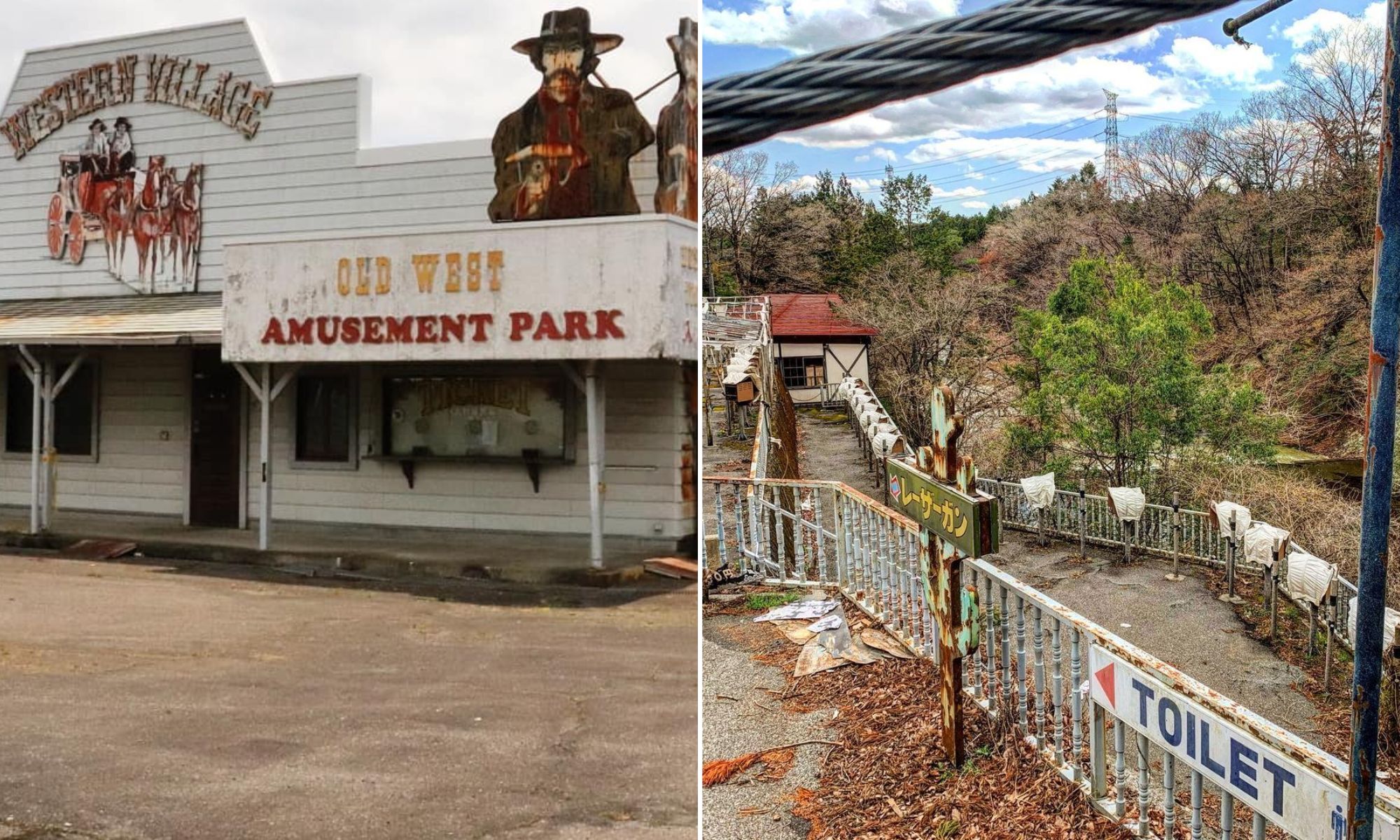
Image adapted from: @graystraytomcat, @narigram_evolution
Due to long-term disuse, the theme park’s facilities are now dilapidated. The worn-out facilities include a bridge appearing one step away from falling apart. The interior of various buildings in the park are similarly in ruins, as if showing the aftermath of a messy gun fight between 2 hot-blooded cowboy.
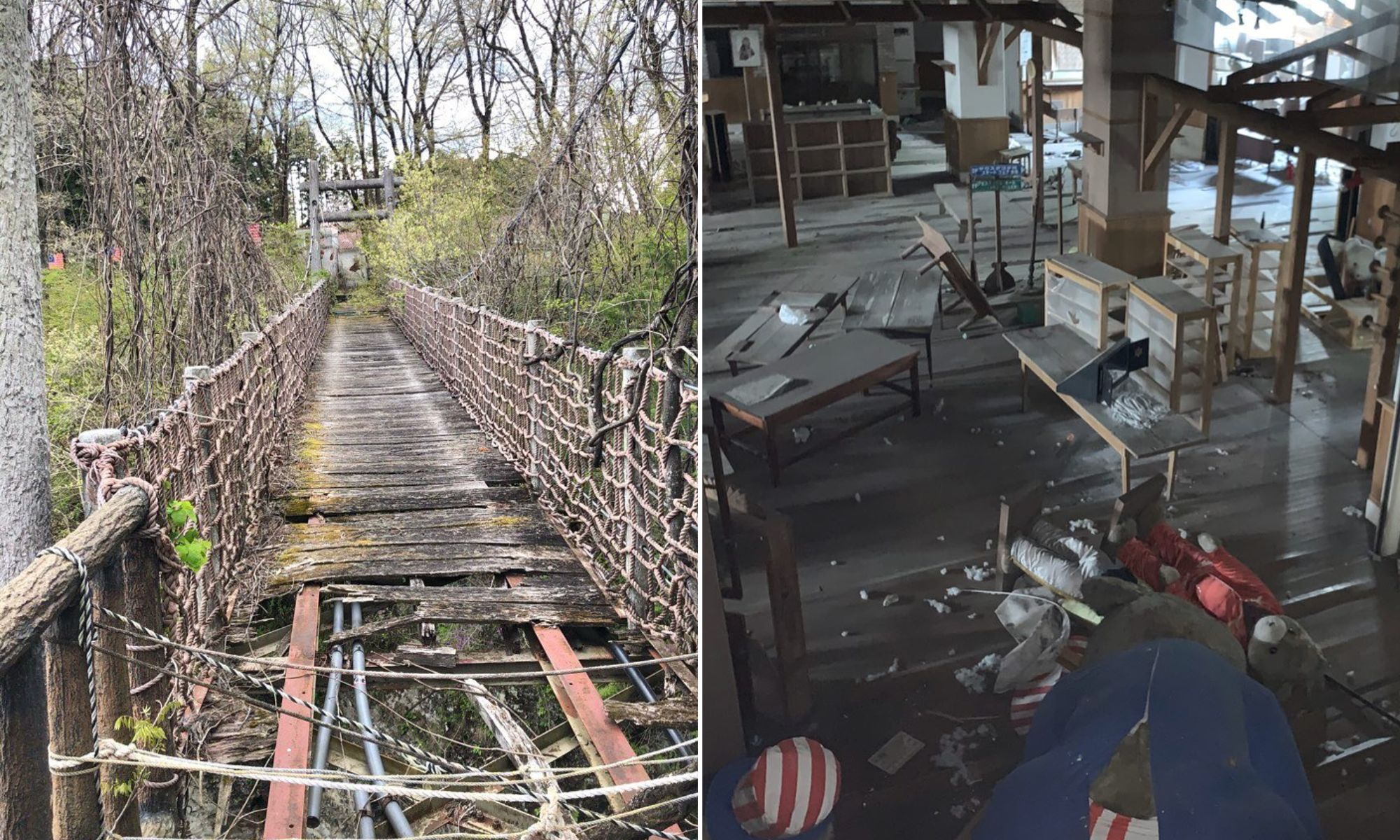
Image adapted from: @k_pamyu2, @d5ysp
Adding to the eeriness are humanoid animatronics that used to serve the Kinugawa Family Ranch, but have long run out of battery. Some are even headless, with mud at their feet resembling dried blood.
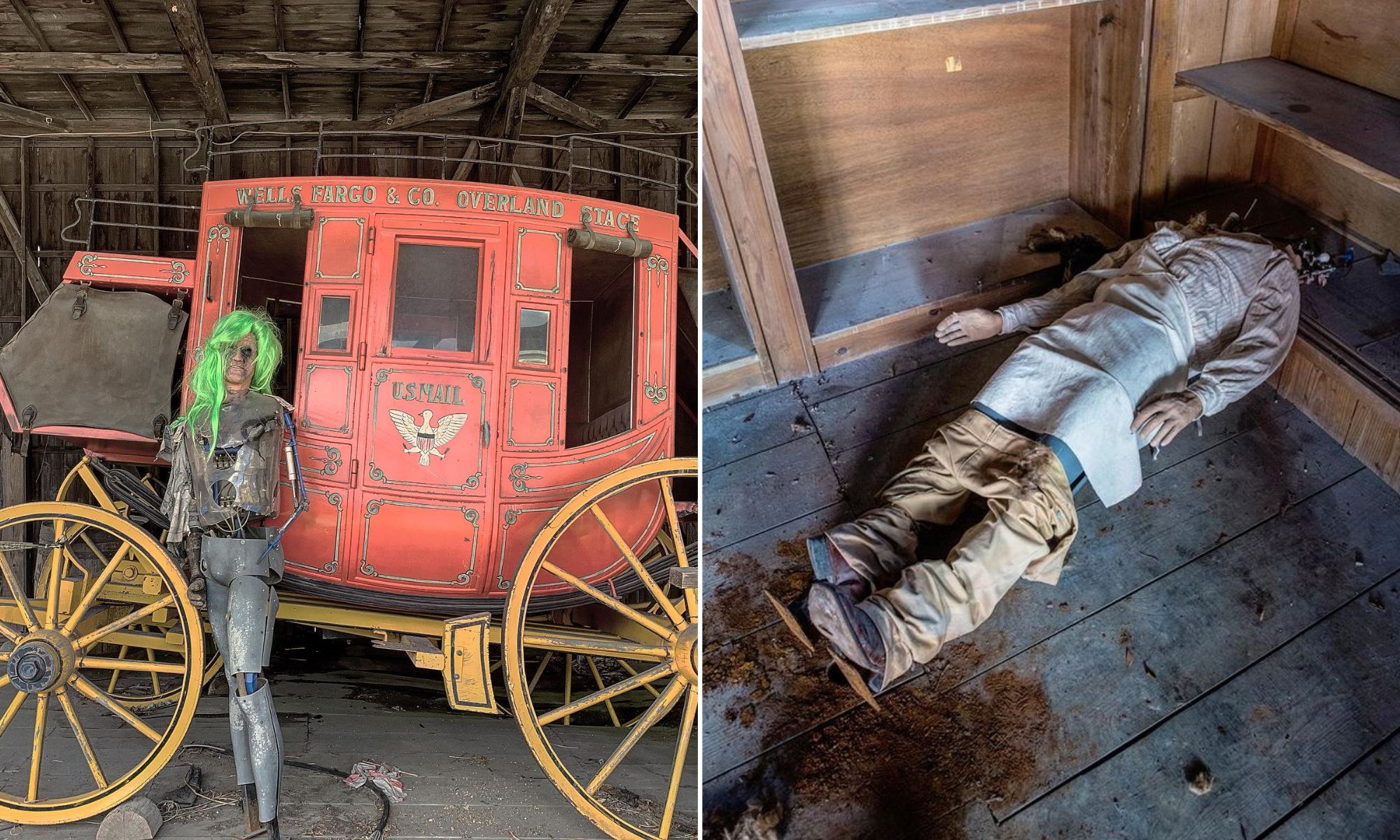
Image adapted from: @narigram_evolution, @nekoriita8581
Due to Western Village’s messy appearance and creepy animatronics, many have drawn parallels between the abandoned theme park and the 2016 HBO series Westworld.
Westworld was set in a futuristic theme park where androids ran amok and started harming humans. Nevertheless, they were ultimately brought under control due to low battery power. See any potential resemblance?
Check out an old video of a Japanese man conversing with Western Village’s animatronics:
Video credit: Hirotosi Suda
Address: 314-5 Kuribara, Nikko, 321-2421 Tochigi
Google Maps pin
6. Hachijo Oriental Resort
Previously known as the Hawaii of Japan, Hachijo Oriental Resort opened in 1963. It was one of the biggest operating hotels in Japan until its closure in 2006 due to poor business.
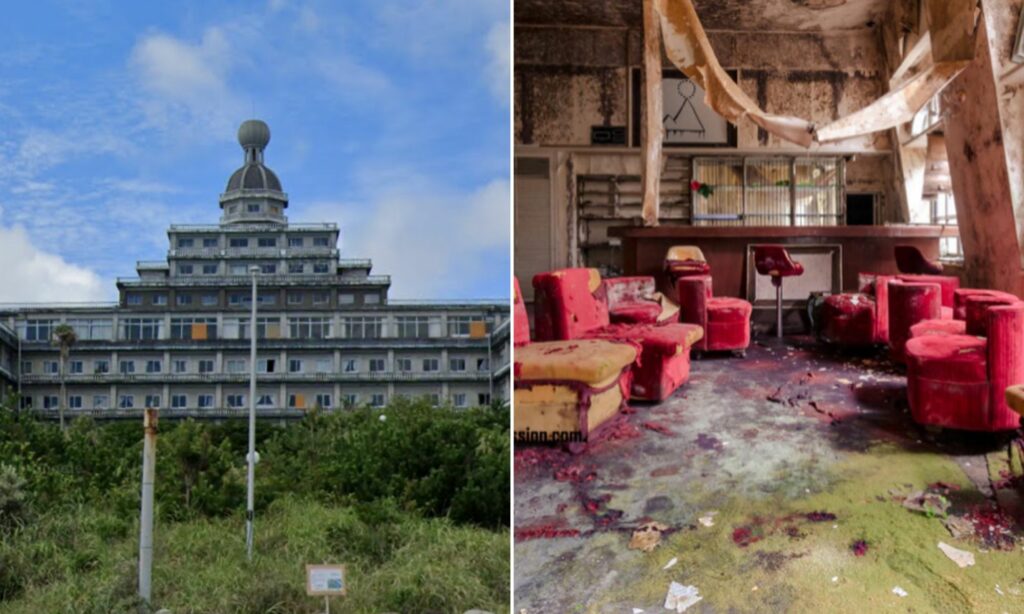
Image adapted from: Google Street View, @ronaldosalon
Right before its desertion, the hotel was featured in a 2006 movie titled Trick: The Movie 2.
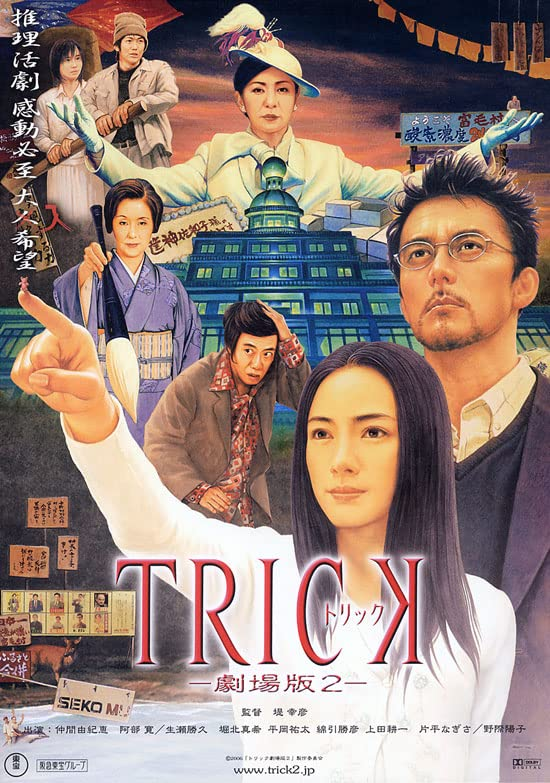
Trick: The Movie 2 poster showing Hachijo Oriental Resort.
Image credit: IMDb
Though Hachijo Oriental Resort has officially closed, the hotel still acts as a living space for greenery and an overnight camping site for daredevils.
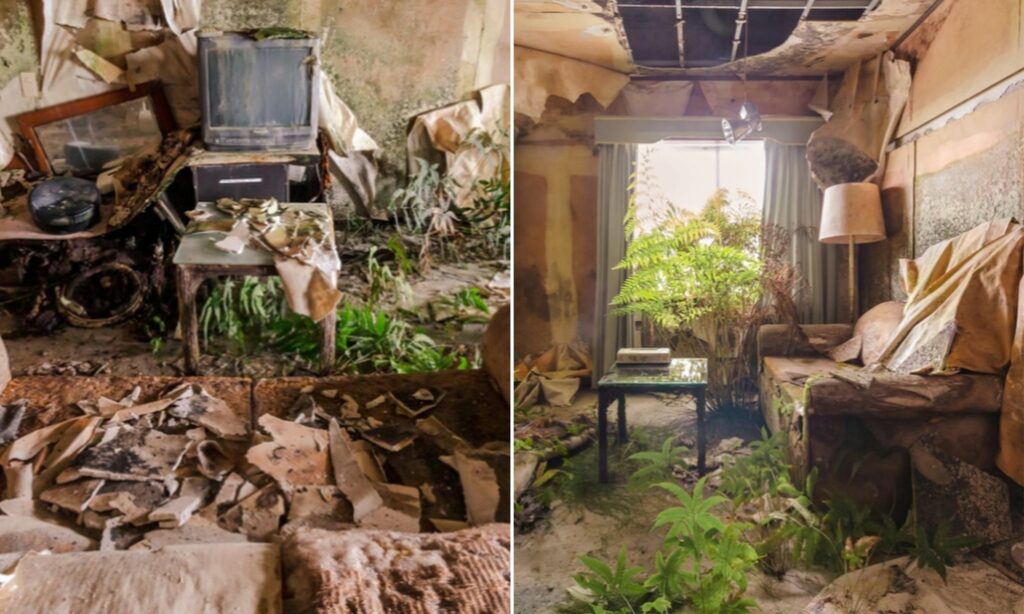
Image adapted from: @ronaldosalon, @ronaldosalon
Both the hotel rooms’ couches and the TVs no longer seem functional, but to each their own.
Address: 886 Mitsune, Hachijo, 100-1511 Tokyo
Google Maps pin
7. Shime Winding Tower
Built for more efficient coal mining, construction of the Shime Winding Tower was completed in 1943. It ended its operations in 1964, thereafter becoming registered as an Important Cultural Property of Japan in 2009 due to its significant role in supplying coal during World War II.
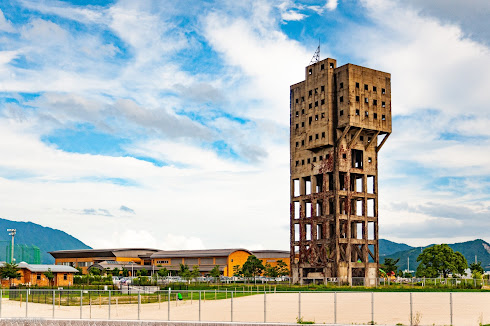
Image credit: @夢煙夏士
At first glance, Shime Winding Tower stands out from the landscape of Fukuoka Prefecture due to its incongruous concrete exterior contrasting against the colourful housing and lush greenery of its surroundings.
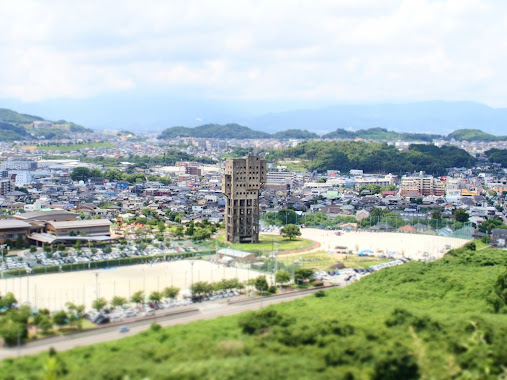
Image credit: @Koji Naito
Some netizens have assigned Shime Winding Tower the nickname “Anti-zombie Fortress”. It all started from a Reddit post praising the infrastructure’s possible resilience against a zombie outbreak.
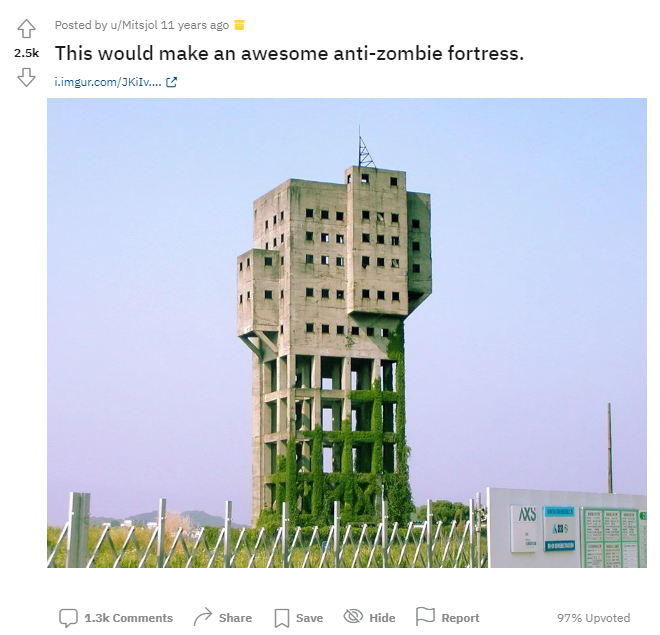
Image adapted from: @Mitsjol
Building said post, another Reddit user estimated how many zombies it would take to render the tower useless as a hiding spot.
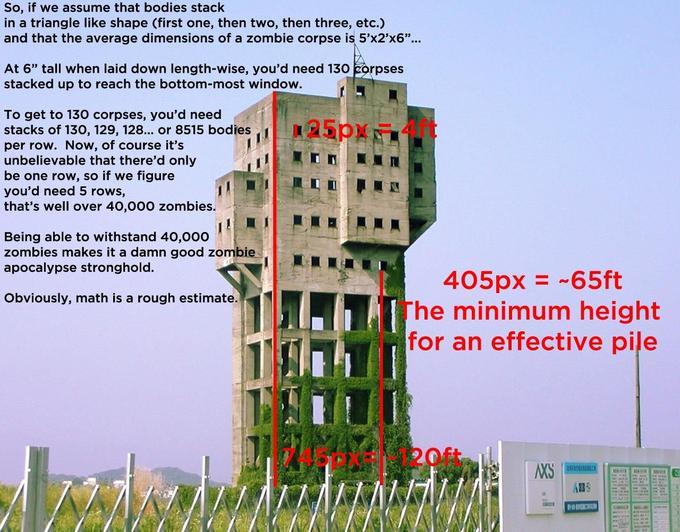
Image credit: @Inspector Javert
Others reinforced the calculations with illustrations of how zombies could climb atop their kind to breach Shime Winding Tower.
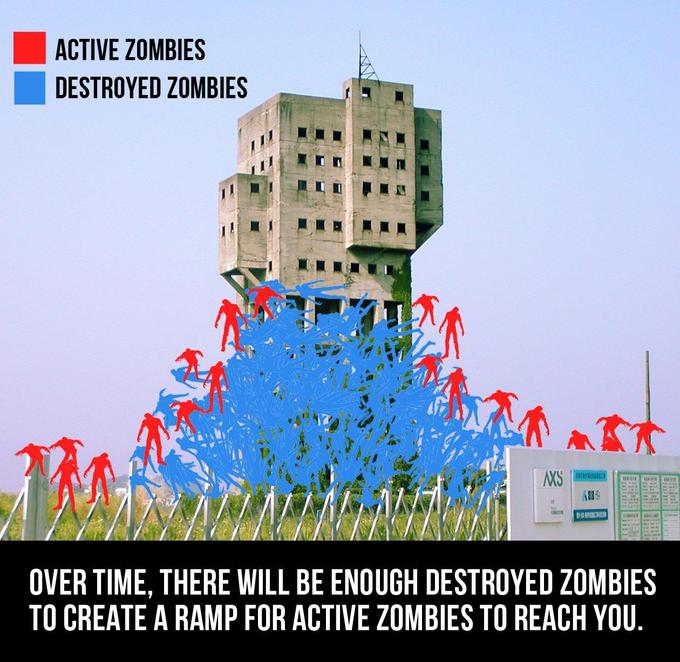
Image credit: @Bernie
Address: 495-3 Shime, Kasuya, 811-2202 Fukuoka
Google Maps pin
8. Hiituujima Restaurant
Built in 1972, Hiituujima Restaurant is located atop an offshore Island in Okinawa Prefecture. The offshore island is known as Hiituujima (ヒートゥー島), which directly translates to “Dolphin Island” in the Okinawan dialect. It was named so because of the dolphin-catching activities that used to occur there.
Hiituujima Restaurant was originally meant as an extension of the main island’s restaurant, Sea Side Drive-in. However, as the restaurant owners failed to obtain a permit to build a bridge connecting the Dolphin Island to the main island, Hiituujima Restaurant was never opened.
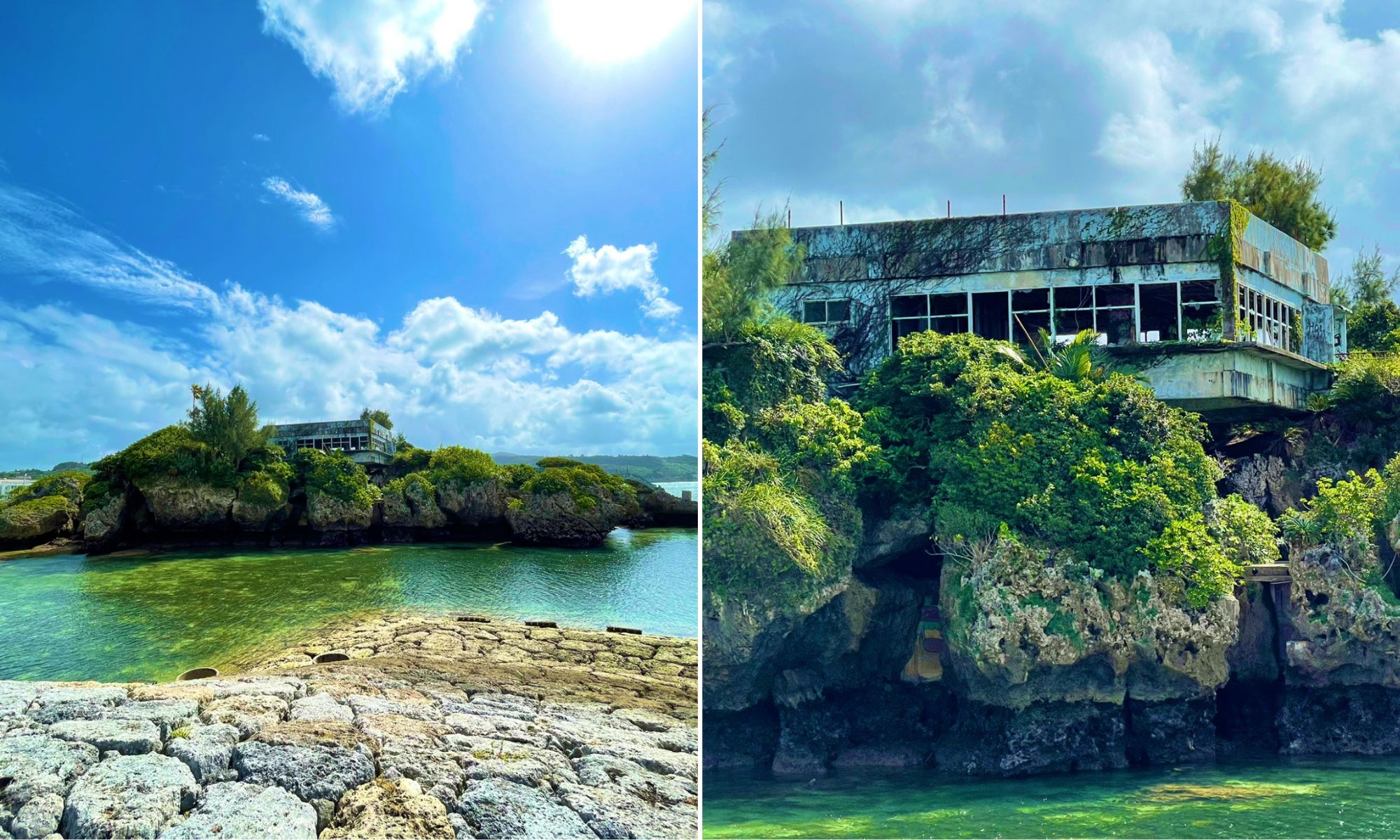
Image adapted from: @mitsujzx100
The abandoned Hiituujima Restaurant is presently in ruins, with shattered glass windows and faded paint. Nevertheless, you can still get a splendid view of the main island from the abandoned restaurant.
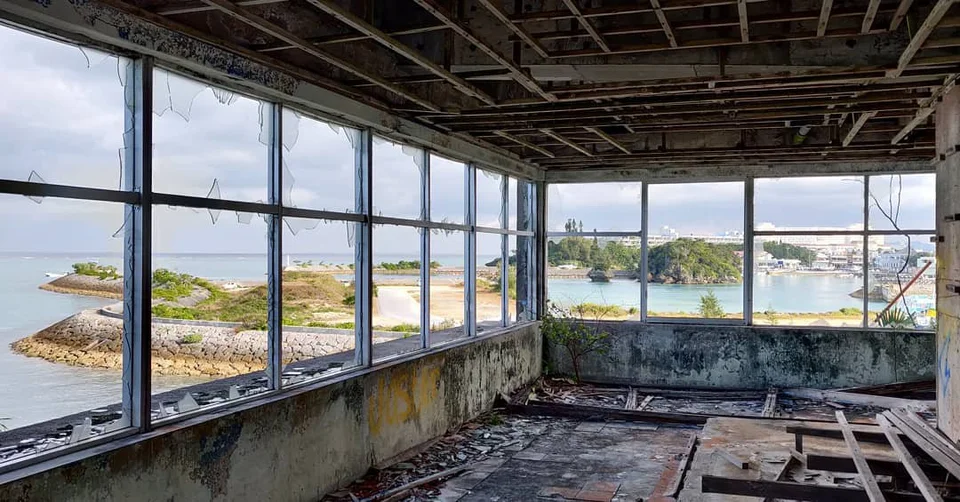
Image credit: @CreamCheeseIsBad
Due to the proximity of Dolphin Island to the main island, passersby often stop to view the island and the restaurant nested within. Some even have picnics while enjoying the sea view.
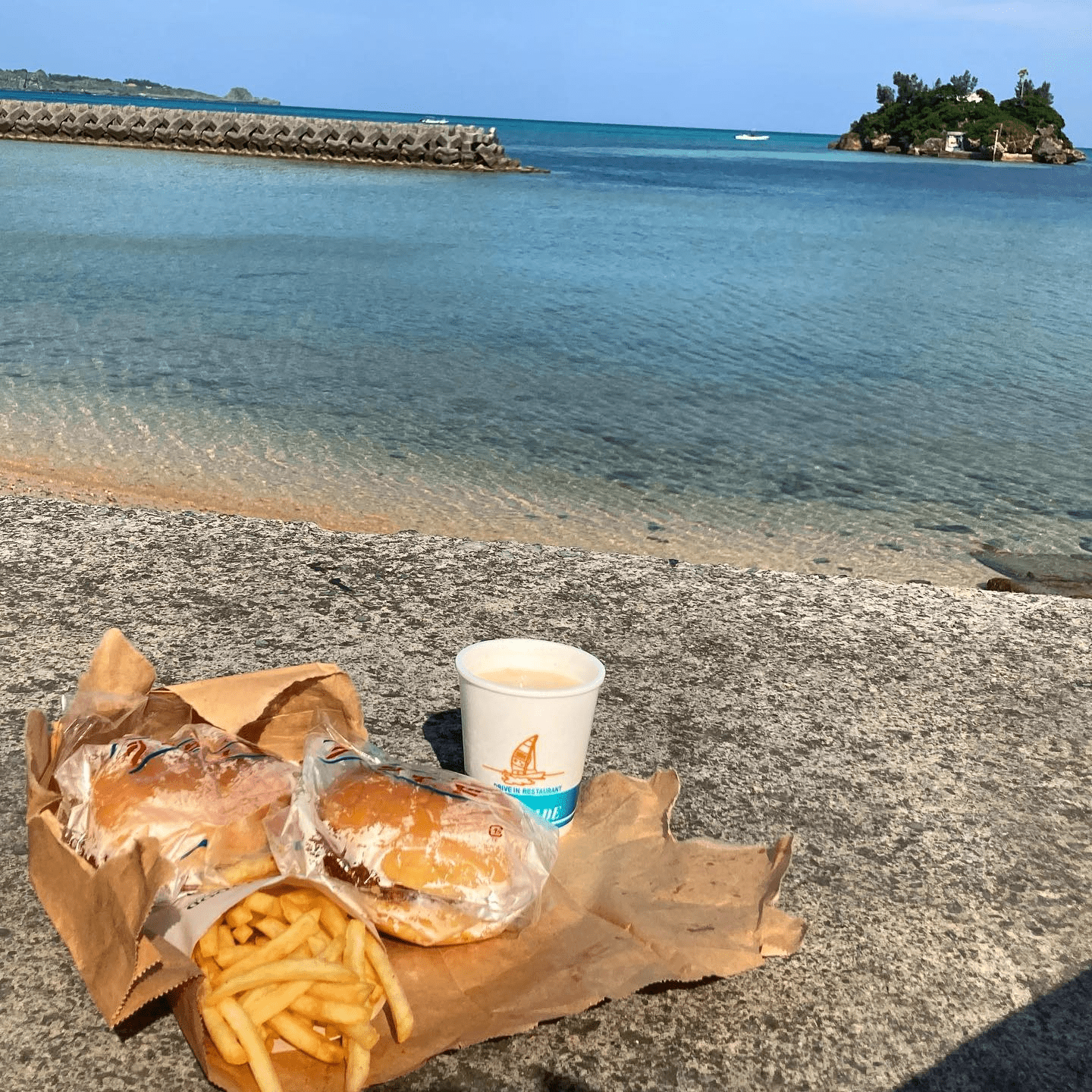
Image credit: @meguko.t
Those who wish to secretly explore the island usually swim over. Others choose to walk there during low tide.
Address: Near Seaside Drive In, 885 Nakadomari, Onna, Kunigami, 904-0415 Okinawa
Google Maps pin
9. Family School Fureai
Family School Fureai used to be a public accommodation facility where Japanese high school students on school trip could rest their weary bodies. And before that, the building used to be known as Asahi Elementary School.
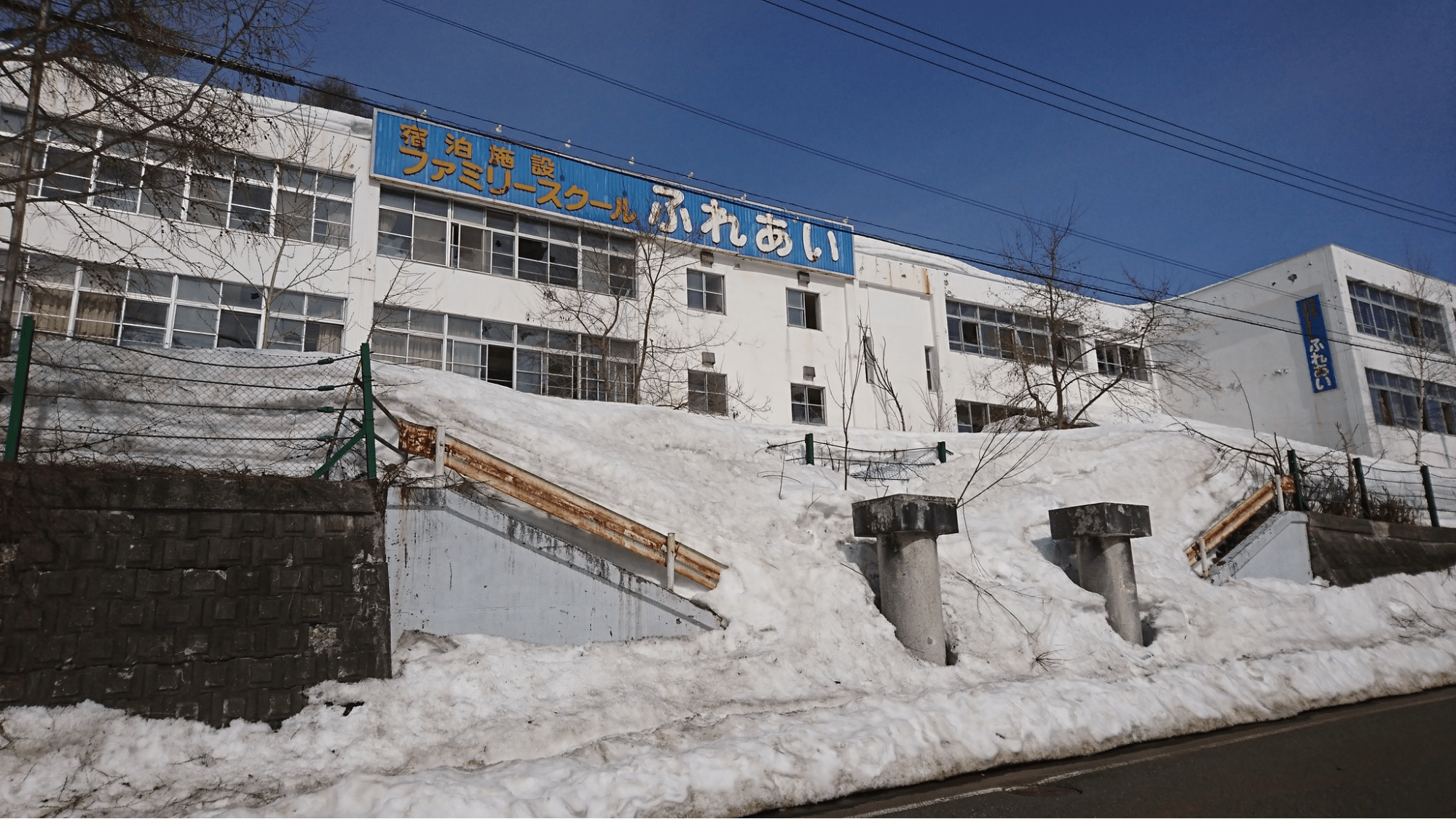
Image adapted from: @HAMATON1975
Family School Fureai closed in 2006 due to the bankruptcy of its managing organisation, Yubari Kanko Kaihatsu (夕張観光開発). Many old infrastructure meant for students are still left behind in the facility, ranging from a bathtub to a piano. However, you’d just get dirtier by bathing in the dust-filled tub.
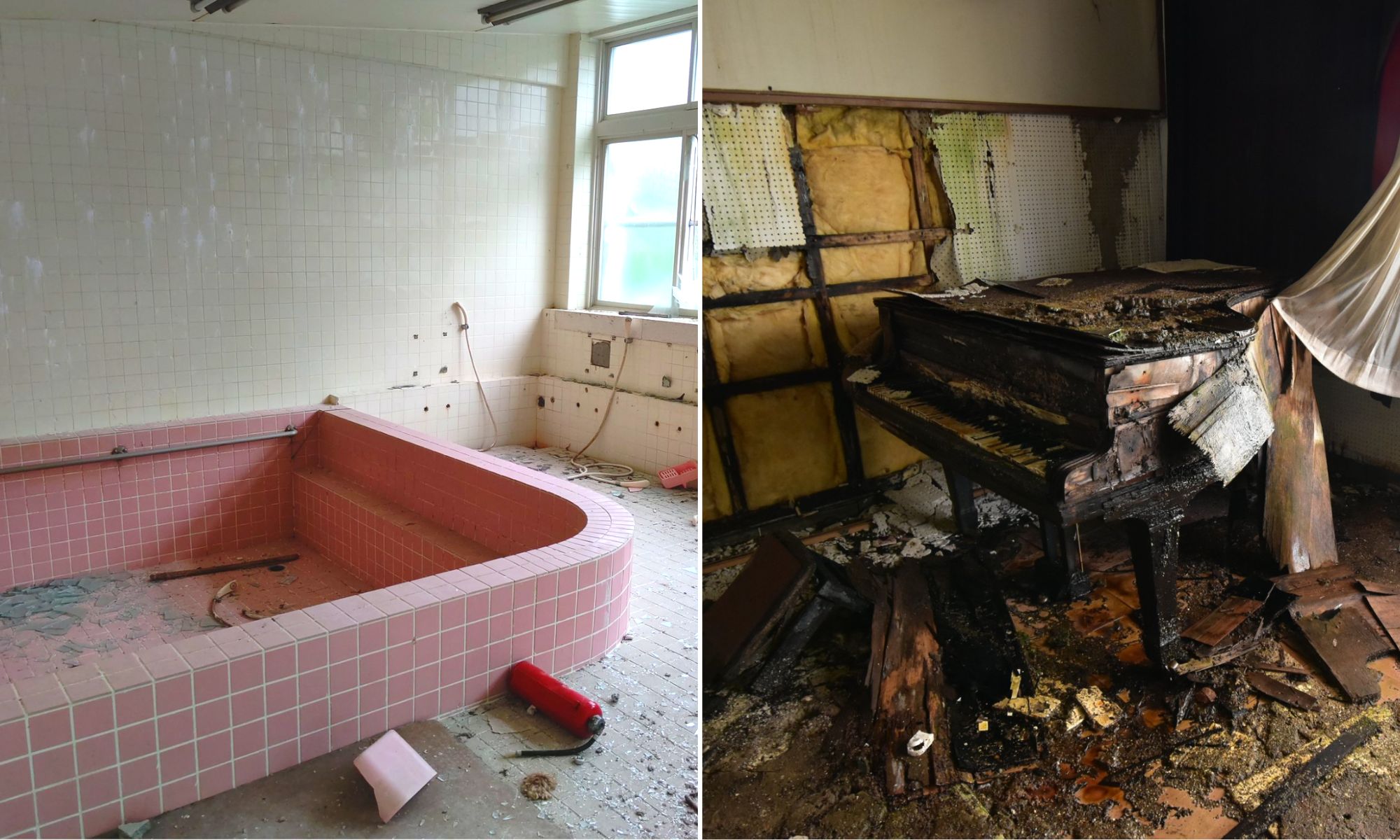
Image adapted from: @Kp7IioWPTgUzHGZ, @wug0029
Given that free-roaming animals are relatively common in Hokkaido, you’d expect some of them to take shelter in the abandoned Family School Fureai. But no amount of mental preparation will prepare you for one particular animal that’s inside 24/7 – a bloodied stuffed seal that sits in a narrow corridor of the facility, ready to scare visitors.
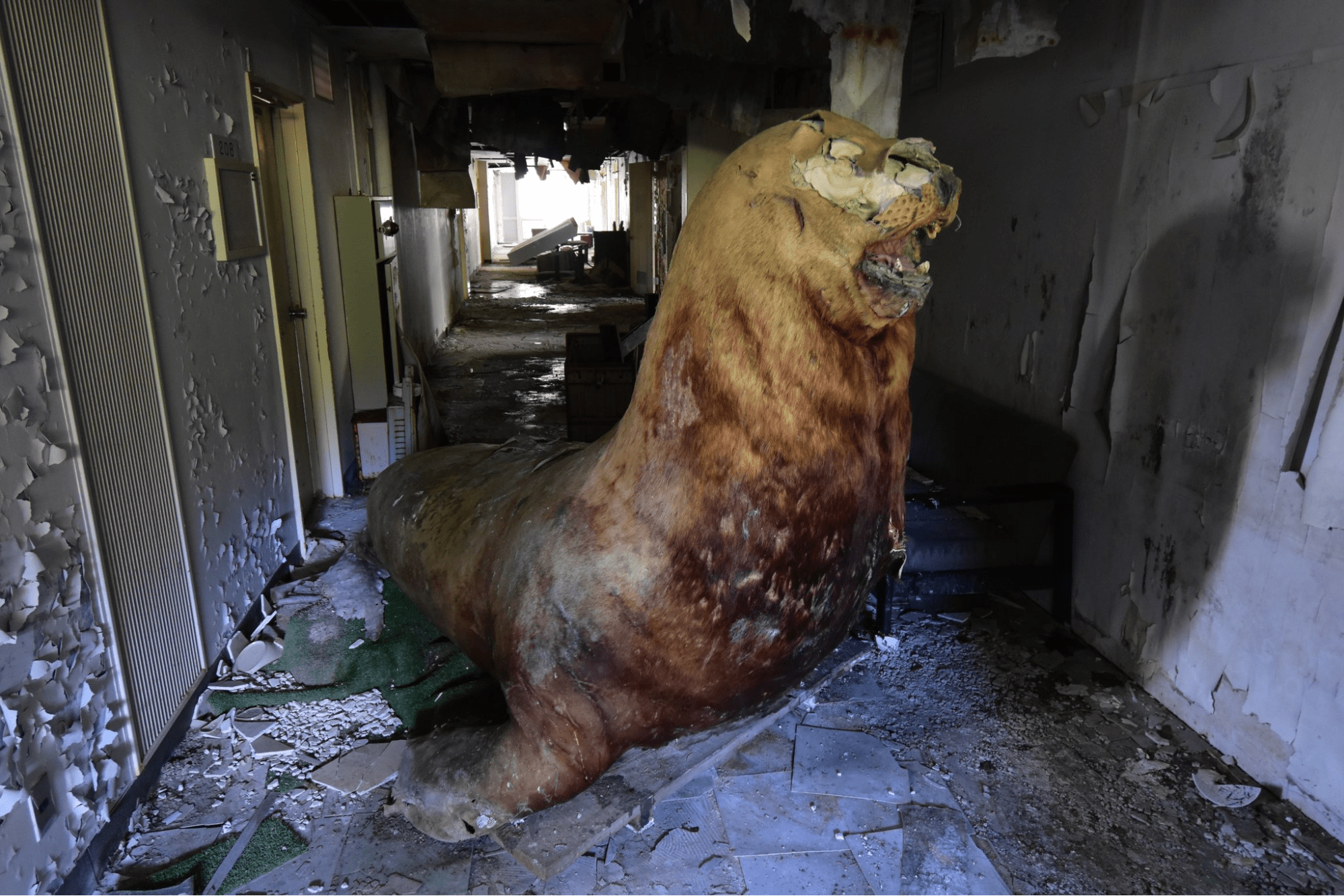
Stuffed seal left behind in the school.
Image credit: @wug0029
Since the seal could have posed a fire hazard and blocked the emergency escape, it’s unlikely that the school placed it there before closing down. In that case, it’s either curious visitors moved the seal after the school was abandoned, or the seal moved by itself. We’re hoping it’s the former.
Address: Fukuzumi, Yubari, 068-0407 Hokkaido
Google Map pin
Abandoned places in Japan
Haikyo spots are frozen in time. That is, until you decide to march in with a passion and relive the once-forgotten experiences within. While the average person would avoid visiting abandoned places in Japan, it is ironically the low human traffic that makes these places all the more adventure-worthy.
Also check out:
- 9 Most haunted places in Japan
- 10 Japanese horror stories to feel less lonely at night
- 9 Japanese urban legends that keep you past your bedtime
- Tokyo mobile haunted house “Screambulance”
- 10 Japanese horror movies to watch
Cover image adapted from: @夢煙夏士 , Hamish Campbell, @CreamCheeseIsBad
